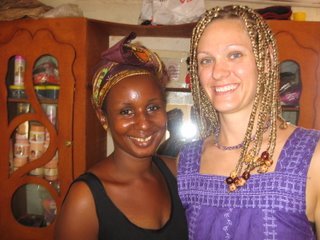
Recently I had my hair braided with extentions 'Rasta style'. It was fun. I was complimented often by many Gambians. I've been here long enough that I don't think it even looked strange on me, a crazy white lady. Often the question that followed, "You are so beautiful with those braids," was, "Who braided your hair?" It's important to give credit where credit is due so I always proudly answered that Ndumbeh braided my hair. She owns her own salon which is a nice small business for a person in The Gambia to have. How do I know Ndumbeh? She is my sister's uncle's wife. So why isn't she just my aunt?
Family relations here are divided between the father's side and the mother's side. I live with a host family. The man who runs the family I call my father, his wife that lives there is my mother and the children that live there or are by these parents are my siblings. I live in an extended family compound so my father's brothers' families also live there. My father's brothers are also called my fathers. Their children are therefore called my brothers and sisters. My father's sisters on the other hand are my aunties. Their children are my cousins. On my mother's side it's similar. My mother's sisters are my mothers and their children are my brothers and sisters. Her brothers are my uncles and their children are my cousins.
So how exactly am I related to Ndumbeh? She is my father's brother's daughter's mother's brother's wife. Easy enough. I understand it but you might want to draw a picture.
Good news! I'm not a refugee anymore! After two weeks of living in Kombo and eating more diary than my body can handle I'm being allowed to go back to my village. I miss my family so I'm looking forward to getting back. I'll miss the food in Kombo--the variety anyway--but there are so many other things I'm looking forward to in my village including my kamo (pit latrine) which believe it or not is much cleaner than just about any toilet here.
So how is the food here? Most of the time I think it's good but very monotonous. I try to help out my family by buying vegetables when I can. Right now is the hungry season which means that since everyone is working in the fields--the women in the rice fields and the men in the groundnut, corn, and/or coos fields--there is no one (no women anyway) to work in the gardens so there are not many vegetables. Most of the work of the gardens is watering them but even though it rains nearly everyday now, no one has time to weed or look after them so we'll have to wait until the dry season before we have much vegetable variety. Shrimp is in season in my village now but it's a little expensive on my budget. I'm definitely going to treat my family when I can--maybe once a week or so. There is always some kind of wonderful fruit in season here. Mangos are at their end but guavas are coming soon as well as the sweetest watermelon I've ever had. There really are some great things in the smallest country in
